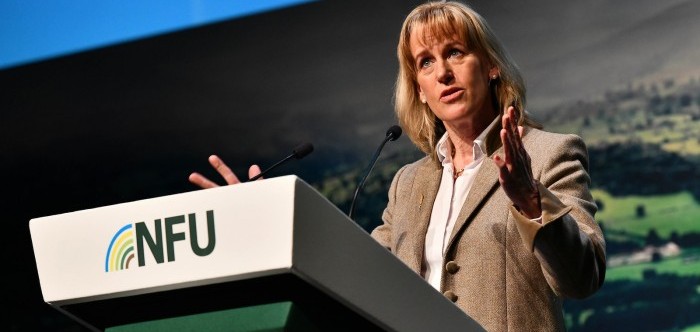The NFU has welcomed the publication of a report by the Trade and Agriculture Commission (TAC), which it said strikes the right balance between liberalising trade and protecting British farm standards.
The NFU fought hard to persuade International Trade Secretary Liz Truss to establish the Commission in 2020, with a remit to advise the government on trade policies that will secure opportunities for UK farmers while ensuring the sector remains competitive and that animal welfare and environmental standards in food production are not undermined.
Chaired by for Food Standards Agency chief executive Tim Smith, its membership incorporate individuals across the agriculture, retail, consumer, hospitality, animal health and environment sectors, including the NFU’s Nick von Westenholz.
Its report, announced by Ms Truss today, includes a number of recommendations to shape the UK’s future trade policy. It can be viewed HERE
REACTION
NFU President Minette Batters said: “The NFU has long argued how important it is to properly examine, and to try to reconcile, the complexities and tensions inherent in government trade policy – one that seeks both to liberalise trade and to safeguard our high food and farming standards and our valued British farming sector. The report does this very well and I thank all of the Commissioners, in particular the Chairman Tim Smith, for their work over the past eight months.
“It’s clear from the report that there is a tough balance to be struck between doing trade deals on the one hand and safeguarding our high standards of food and farming on the other. This report dispels the notion that it is easy, which is the message UK farmers and the British public have too often been given.
“I commend the Commission for setting out a bold vision to manage those tensions, growing our exports and improving our competitiveness while continuing to meet the high expectations of UK consumers for high quality, sustainably-produced food. But the report is also clear that this will involve trade-offs and difficult decisions and that there will be winners and losers as the government pursues its new, independent trade policy.
“Ultimately, how those trade-offs are managed and weighed remains a decision for ministers and it is vital that the government now sets out, without delay, how it intends to accommodate these recommendations within a trade strategy that works for UK farmers and consumers alike.
“At its core such a strategy must contain a clear commitment to support our farmers in producing food to the highest standards of animal welfare and environmental protection, in leading the world in climate-friendly farming and in remaining the beating heart of our rural communities. I am pleased to see such an approach reflected in the Commission’s deliberations.
“There are many good recommendations in the report that the government should adopt, in particular the need for a coherent and explicit trade strategy encompassing both Free Trade Agreements (FTAs) and general trade policy, an approach to imports that has our high standards of production at its core, and a Food and Drink Exports Council to foster a collaborative and targeted approach to growing markets overseas.
“Of course, this is only the start of the next stage of the journey. We look forward to the Secretary of State setting out her detailed response to the report very soon and we also await the operational details of the Statutory TAC which will follow up this work, scrutinising trade deals before they are ratified.
“The Commission has set the stage for government to develop its trade policy in a way that puts the UK at the forefront of more sustainable models of production and consumption both here and across the world. I hope the government seizes that opportunity with both hands.”
Country Land & Business Association President Mark Bridgeman said: “It is encouraging to see the report recognise that maintaining and further improving our high animal welfare and environmental standards is critical to the future of farming.
“We should never apologise for our high standards, they are the foundations on which British farming are built. The public should be proud of them and Government should not only defend them, but put them at the heart of the UK’s international trade strategy.
“It is inevitable that the sector will continue to restructure post-Brexit, but in farming the line between success and failure is often very thin. So, as we continue our transition away from the old subsidies and towards the new Environmental Land Management Schemes, Government must do all it can to provide certainty and stability to a sector that is determined to feed the nation and beyond, but somewhat weary of never quite knowing the direction Government is taking us.”
RSPCA Chief Executive Chris Sherwood said: “We are very encouraged by the Commission’s recommendations that animal welfare standards should be protected and enhanced as the UK sets trade policy and negotiates Free Trade Deals with other countries.
“We agree with the report’s assessment that the Government has a huge opportunity to demonstrate global leadership on animal welfare standards by setting trade policy that makes it unviable to import products from animals that have been reared to lower standards than our own. This would support the UK’s agriculture and food industry, respond to consumer demand for ethically produced food and show that the UK really does lead the way when it comes to animal welfare.
“We also agree that a dedicated trade minister, championing animal welfare standards, ethical trade and policy coherence across the whole of Government would be invaluable in helping Government achieve its free trade ambitions whilst ensuring there is no back sliding on standards.”




